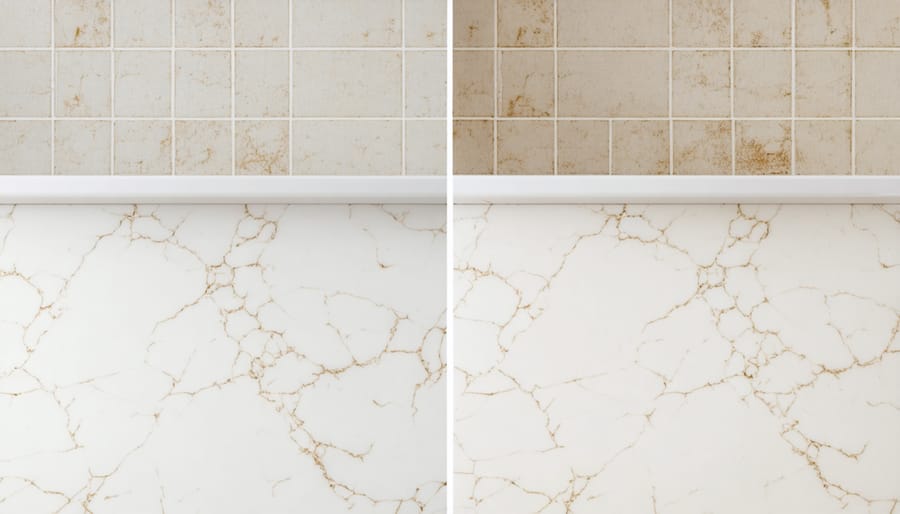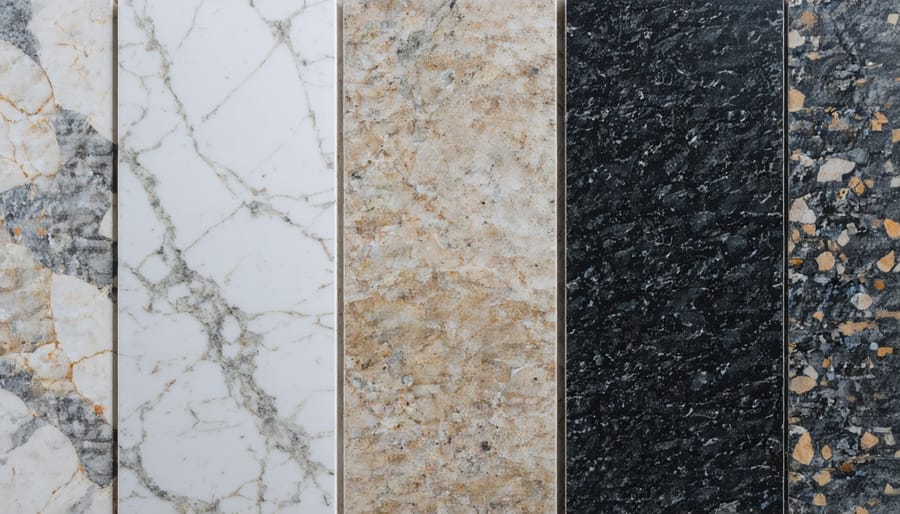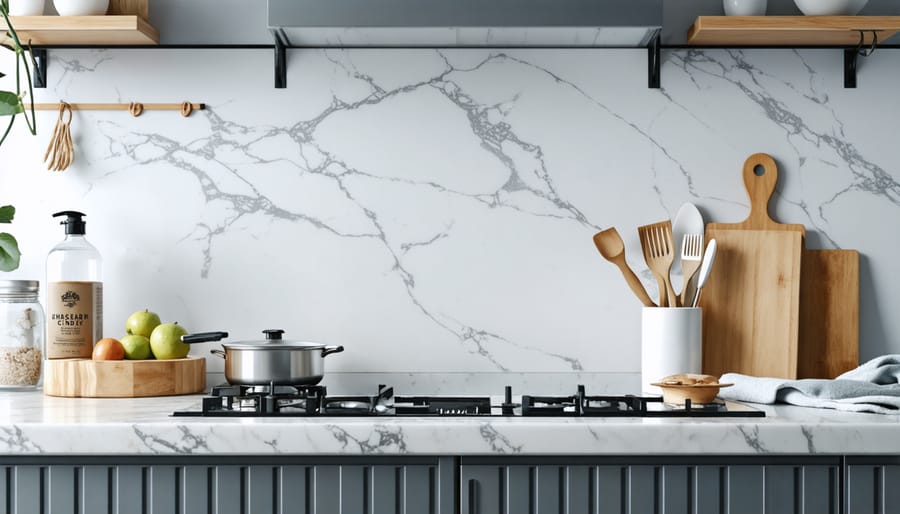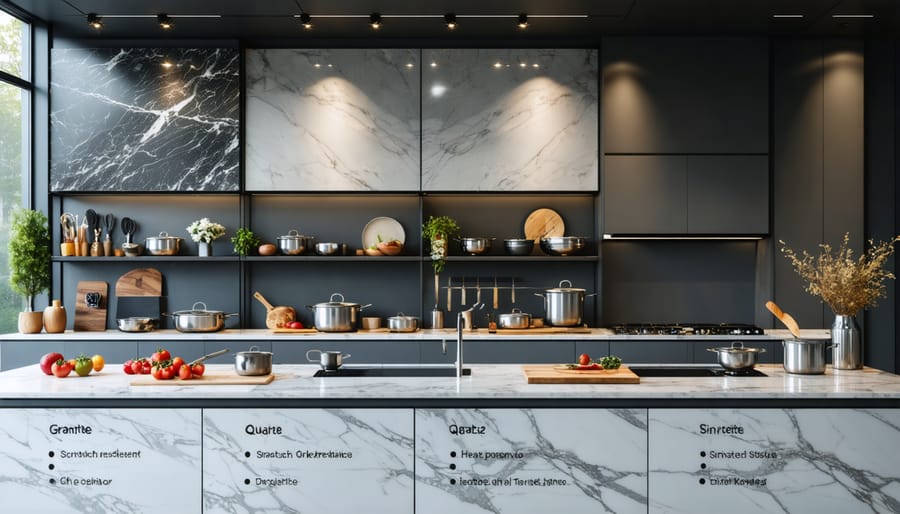Choosing the right countertop material can mean the difference between a kitchen that lasts decades and one that needs replacement within years. Today’s most resilient countertop options combine breakthrough engineering with time-tested natural materials, delivering surfaces that withstand intense daily use while maintaining their beauty. From granite’s near-indestructible crystalline structure to engineered quartz’s laboratory-certified resistance to scratches, stains, and impacts, modern countertop materials are specifically designed to handle everything from hot pans and sharp knives to acidic foods and harsh cleaning products. This guide examines the top-performing materials that consistently rank highest in independent durability testing, focusing on impact resistance, heat tolerance, scratch resistance, and long-term wear patterns under real kitchen conditions. Whether you’re designing a professional-grade cooking space or updating a busy family kitchen, understanding these material characteristics will help you make an investment that delivers lasting value and performance.
What Makes a Kitchen Countertop Truly Durable?
Key Durability Factors
When comparing durability between materials, four key factors determine a countertop’s longevity. Scratch resistance measures how well a surface withstands daily wear from kitchen utensils and abrasive materials. Materials like quartz and granite excel here, maintaining their finish even under heavy use.
Heat resistance is crucial in kitchen environments where hot pots and pans are commonplace. Natural stone materials typically offer excellent heat resistance up to 400°F, though sudden temperature changes should still be avoided. Impact resistance determines how well a countertop withstands dropped objects and heavy blows. While most engineered stones offer good impact resistance, some natural stones may chip if struck with excessive force.
Chemical resistance is particularly important in kitchens where acidic foods, cleaning products, and spills are frequent. This factor measures how well a surface resists staining and etching from common household substances. Premium materials like quartz and sealed granite provide superior chemical resistance, maintaining their appearance despite exposure to acids, oils, and cleaning agents.

Understanding Durability Ratings
When evaluating countertop durability, the Mohs hardness scale serves as a fundamental measuring tool, rating materials from 1 (softest) to 10 (hardest). Most kitchen-grade materials fall between 6 and 8 on this scale, with diamonds at 10 setting the benchmark for maximum hardness.
Beyond the Mohs scale, industry professionals use additional metrics to assess countertop durability. These include abrasion resistance (measured by the ASTM C1353 test), impact resistance (tested through drop-weight analysis), and chemical resistance ratings. Higher scores in these categories indicate better performance under real-world conditions.
For kitchen countertops, manufacturers also provide specific ratings for heat resistance, scratch resistance, and stain resistance on a scale of 1-5, with 5 being the most resistant. These practical ratings help homeowners understand how materials will perform during daily use.
Understanding these ratings is crucial for making an informed decision, as different areas of your kitchen may require varying levels of durability. High-traffic areas near sinks and stoves typically need materials with higher durability ratings than less-used spaces.

Top-Performing Durable Countertop Materials
Granite: Nature’s Armor
Granite has earned its reputation as one of nature’s most formidable materials, making it an exceptional choice for kitchen countertops. With a Mohs hardness rating of 6-7 out of 10, granite offers remarkable resistance to scratching, chipping, and everyday wear. This natural stone is formed under intense heat and pressure, resulting in an interlocking crystalline structure that provides superior durability and strength.
What sets granite apart is its ability to withstand high temperatures without damage. You can place hot pots and pans directly on its surface without fear of scorching or cracking. The material’s natural heat resistance makes it ideal for busy kitchens where cooking activities are frequent and intense.
While granite is nearly indestructible under normal use, it does require some maintenance to preserve its beauty and durability. A properly sealed granite countertop resists staining and maintains its resistance to bacteria and moisture. Typically, sealing is needed once every 1-2 years, depending on use and the specific stone variety.
Daily maintenance is straightforward: clean with warm water and mild soap, avoiding acidic or abrasive cleaners that could compromise the sealant. For stubborn stains, specialty granite cleaners are available and effective. Small chips or scratches, while rare, can be professionally repaired to restore the surface’s original appearance.
An investment in granite pays off through decades of reliable service. When properly maintained, these countertops can last a lifetime, often outlasting multiple kitchen renovations. Their durability, combined with timeless aesthetic appeal, makes granite a practical choice for homeowners seeking both beauty and longevity in their kitchen surfaces.
Quartz: Engineered Excellence
In the realm of kitchen countertops, engineered quartz surfaces stand as a testament to modern manufacturing excellence, combining nature’s durability with technological precision. Composed of roughly 93% natural quartz crystals bound together with premium resins and pigments, these surfaces offer unparalleled strength and resilience.
Unlike natural stone, quartz countertops are engineered to be virtually indestructible, scoring a remarkable 7 out of 10 on the Mohs hardness scale. This exceptional hardness translates to superior scratch resistance, making these surfaces ideal for high-traffic kitchens where sharp utensils and heavy cookware are daily challenges.
What sets quartz apart is its non-porous nature, eliminating the need for sealing while providing built-in protection against stains, bacteria, and moisture. Coffee spills, wine accidents, and acidic foods pose minimal threat to these surfaces, making them particularly appealing for busy households.
Impact resistance is another standout feature, with quartz being significantly less likely to chip or crack compared to natural stone alternatives. The manufacturing process creates a uniform internal structure that distributes force evenly, reducing weak points common in natural materials.
Maintenance requirements are remarkably straightforward: simple cleaning with mild soap and water is typically sufficient to maintain its pristine appearance. This low-maintenance characteristic, combined with its exceptional durability, makes quartz an increasingly popular choice for homeowners seeking long-term value and reliability in their kitchen investments.
The material’s engineered nature also ensures consistent coloring and pattern throughout the entire slab, eliminating the unpredictability often associated with natural stone variations.
Quartzite: The Rising Star
Among natural stone countertop materials, quartzite has emerged as a formidable contender, often surpassing granite in terms of hardness and durability. While many people confuse it with manufactured quartz, understanding the quartz and quartzite differences is crucial for making an informed decision.
Quartzite forms when pure quartz sandstone undergoes intense heat and pressure during metamorphic processes, resulting in an exceptionally hard natural stone. On the Mohs scale of mineral hardness, quartzite typically rates between 7 and 8, significantly harder than marble (3-4) and even granite (6-6.5). This superior hardness translates to remarkable resistance against scratching, chipping, and everyday wear.
What makes quartzite particularly appealing is its combination of durability with aesthetic appeal. The stone naturally occurs in light, neutral colors with crystalline patterns reminiscent of marble, though some varieties display stunning blues, reds, and browns. Unlike softer stones, quartzite stands up exceptionally well to heat, making it ideal for busy kitchens where hot pots and pans are common.
While quartzite requires sealing like most natural stones, its maintenance needs are relatively minimal. A properly sealed quartzite countertop resists staining and maintains its beauty with basic care. The material’s growing popularity among luxury builders and designers stems from its ability to deliver both the practical benefits of extreme durability and the sophisticated look of high-end natural stone.
For homeowners seeking a long-term investment in their kitchen, quartzite offers an optimal balance of strength, beauty, and functionality.
Sintered Stone: The Latest Innovation
Sintered stone represents a groundbreaking advancement in countertop materials, combining natural raw materials with cutting-edge manufacturing processes. Created through particle technology and extreme heat and pressure, these ultra-compact surfaces offer exceptional durability that rivals, and in many cases surpasses, traditional stone options.
The manufacturing process involves subjecting mineral particles to pressures of up to 25,000 pounds per square inch and temperatures exceeding 2,000°F. This results in a non-porous, ultra-dense material that’s virtually impervious to scratches, stains, and heat damage. Unlike natural stone, sintered surfaces don’t require sealing and maintain their appearance without regular maintenance.
What sets sintered stone apart is its remarkable resistance to common kitchen challenges. You can place hot pots directly on the surface, cut vegetables without worry about scratches, and clean up acidic spills without fear of etching. The material’s near-zero porosity also makes it highly resistant to bacterial growth, making it an exceptionally hygienic choice for food preparation areas.
Leading brands like Dekton, Neolith, and Lapitec offer sintered stone in a wide range of colors and patterns, including realistic marble and concrete looks. These surfaces typically come with extensive warranties, often 25 years or more, reflecting manufacturers’ confidence in their durability.
While the initial cost may be higher than some traditional options, sintered stone’s longevity and minimal maintenance requirements make it a cost-effective choice in the long run. For homeowners seeking the ultimate in durability and performance, sintered stone represents the latest evolution in countertop technology.
Making Your Durable Countertop Last Even Longer

Essential Care Tips
To maximize the lifespan of your durable kitchen countertops, establish a consistent care routine. Daily maintenance should include wiping surfaces with a soft, damp cloth and mild soap, followed by thorough drying to prevent water spots. Clean spills immediately, especially acidic substances like wine, citrus juices, or vinegar, which can etch natural stone surfaces.
For weekly care, use pH-neutral cleaners specifically designed for your countertop material. To properly maintain granite countertops and other natural stone surfaces, avoid abrasive cleaners, bleach, or ammonia-based products that can damage the sealer or surface.
Implement these protective measures:
– Use cutting boards to prevent scratches
– Place hot pads or trivets under heated items
– Apply coasters under glasses to prevent rings
– Reseal natural stone surfaces annually
– Check for and repair any chips or cracks promptly
For engineered surfaces like quartz, while generally low-maintenance, still follow manufacturer guidelines for cleaning products. Many premium countertop materials come with specific care instructions that, when followed correctly, can extend their lifespan significantly. Regular inspection of seams, edges, and overall surface condition helps identify potential issues before they become serious problems.
Professional Maintenance
While regular daily maintenance is essential, certain situations call for professional intervention to maintain your countertop’s durability and appearance. Professional maintenance should be scheduled annually for most countertop materials, though some may require more frequent attention depending on use and exposure.
Natural stone countertops, particularly marble and granite, benefit from professional resealing every 1-2 years. A professional can accurately assess the stone’s porosity and apply high-grade sealants that provide superior protection against stains and moisture. They also have specialized tools to remove deep-set stains and repair minor chips or scratches that DIY methods can’t address.
For quartz surfaces, while generally low-maintenance, professional help might be needed for removing stubborn stains or addressing any separation at the seams. Professionals can also restore the surface’s original shine if it becomes dull over time.
Contact a certified stone professional immediately if you notice:
– Deep scratches or chips
– Cracks or fissures
– Stubborn stains that won’t lift
– Separation at the seams
– Unusual discoloration
– Loss of shine or seal failure
Working with certified professionals ensures proper techniques and appropriate products are used, preventing accidental damage that could void your warranty. Many manufacturers maintain lists of approved service providers who understand the specific requirements of their materials.
When selecting a kitchen countertop, durability should be a top priority for long-term value and performance. Quartz consistently ranks as the most durable option, offering exceptional resistance to scratches, heat, and stains without requiring sealing. Granite follows closely behind, providing excellent durability when properly sealed and maintained. For those seeking industrial strength, stainless steel delivers unmatched toughness, while concrete offers customizable durability with proper sealing and maintenance. Remember that even the most durable materials require appropriate care to maintain their longevity. Consider your lifestyle, maintenance preferences, and budget when making your final selection. By choosing one of these proven durable materials and following proper care guidelines, you’ll ensure your kitchen countertops remain beautiful and functional for years to come.










